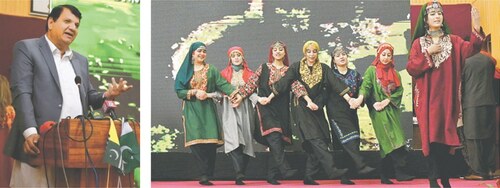ISLAMABAD: A screening of A Tale of Samurai Cooking – a True Love Story, a historical romance set in the Kaga Domain of Japan’s Edo period that melded fact with fiction to give a behind-the-scenes look into the lives of the samurai, was held at the Serena Hotel on Wednesday.
The screening was hosted by the Embassy of Japan, as part of a series of events organised to mark the 65th anniversary of Japan-Pakistan relations, Ambassador Takashi Kurai said at the event.
“The Embassy of Japan has been holding Japanese film festivals in various cities of Pakistan for decades to provide an opportunity for the people of Pakistan to learn about various aspects of Japanese traditions, culture, lifestyle and society through films,” he said.
The film followed Haru (Aya Ueto), a maidservant with a knack for cooking who finds herself married to Dennai Yasunobu (Kengo Kora) at the behest of his father Dennai Funaki (Toshiyuki Nishida).
Funaki is the Maeda warlord clan’s head chef – a samurai with kitchen knives – charged with the important task of preparing food for the samurai.
Funaki sees the marriage as the only way to ensure that Yasunobu carries on the family tradition, as he is a dreadful cook.
But the resentful and arrogant Yasunobu dreams of being a ‘real’ samurai.
He is also intimidated by the idea of filling his deceased older brother’s shoes and, to make matters worse, carries a torch for someone else while trying to adopt a veneer of machismo by making bigoted statements, such as comparing all women to taro (a root vegetable), “because you peel them and they’re all the same.”
Haru’s skill and her status as a woman who was “sent home” from her previous marriage for speaking her mind is an interesting feminist contrast, as she strives to instil in her new husband the warrior trait of doing ones duty.
While striving to improve his culinary skills, she also saves him by undermining his attempt to join a revolt against the conservative rulers of the realm.
Lending more credence to the truth of the story was the backdrop of the Kaga Disturbance.
The Funakis survived the civil war that occurred between two Shogun brothers, and its subsequent influence upon the people who lived in the region, going on to serve the Kaga daimyos until the end of feudalism in the 19th century, leaving behind several tomes of highly prized recipes that sit within the Japanese national vaults today.
Thus, Haru saves the Funaki clan from political disgrace and possibly extinction.
The romantic drama is restrained, as it gently challenges gender roles, places a traditional samurai in the kitchen to fight a different battle during peace, and remains centred through it all on the mismatched young couple.
Ameera Shah, who attended the screening, said she enjoyed the film, calling it “a very sweet drama” with “beautiful” costumes and sets.
Published in Dawn, December 14th, 2017
















































Dear visitor, the comments section is undergoing an overhaul and will return soon.